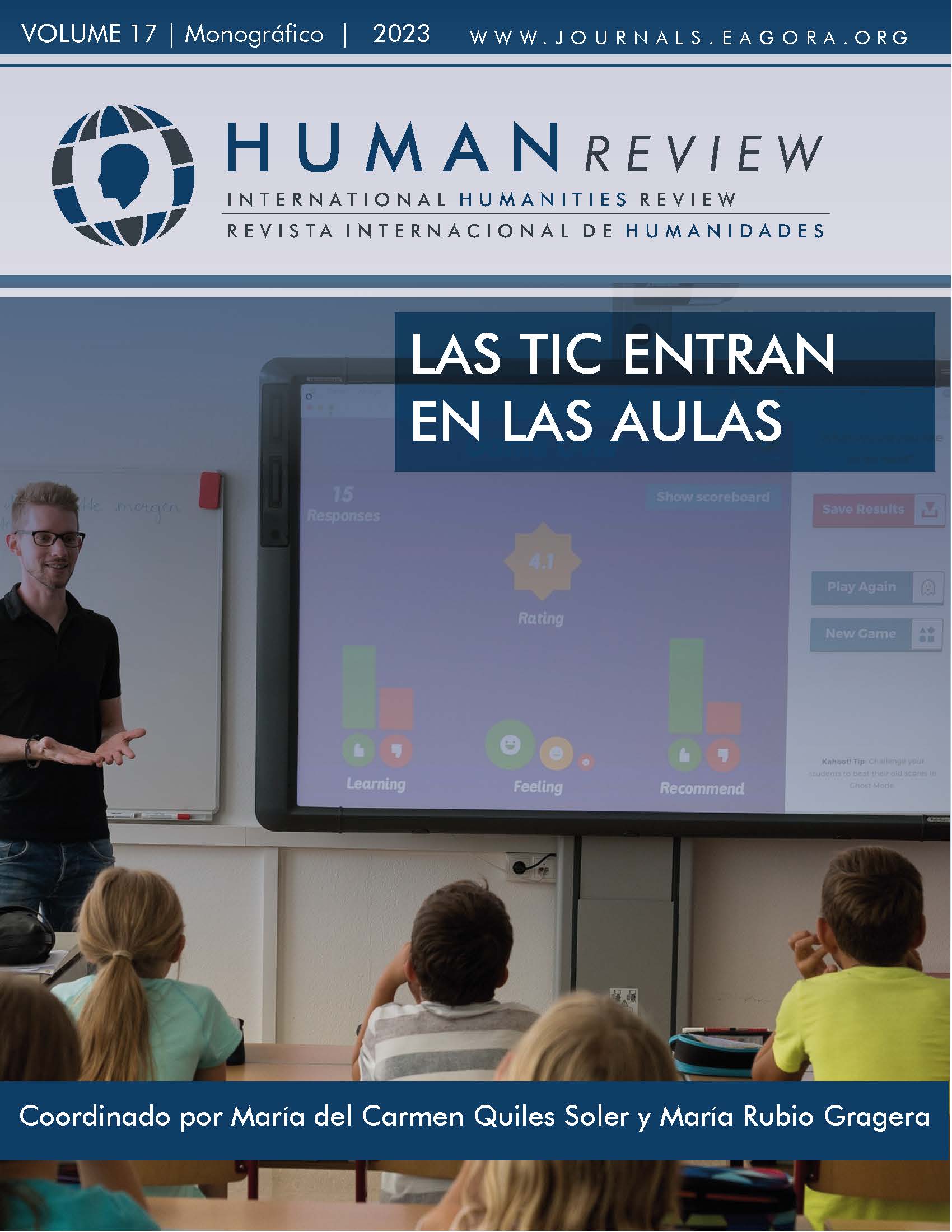The use of ICTs as an empowering tool in the teaching-learning process of Arabic as a foreign language
DOI:
https://doi.org/10.37467/revhuman.v12.4742Keywords:
ICTs, Teaching, Arabic, Development, SkillsAbstract
The emergence of new forms of information and communication technologies (ICTs) in the socio-cultural arena has generated considerable changes in several aspects of our daily life. Therefore, in order to optimize the teaching process and keep up with the necessities of a rapidly changing environment, more and more educational institutions ended up raising up the challenge of integrating the use of new technologies in their day-to-day activities. The present article places emphasis on the importance of integrating ICTs in the process of teaching and learning spanish as a foreign language, illustrating the added value of taking advantage of some technological tools and resources inside and outside the classroom setting. To this end, it carries out a descriptive and explanatory analysis of these tools in the hope that students could take advantage thereof.
References
Adell, J. (1997). Tendencias en educación en la sociedad de las tecnologías de la información. EDUTEC, 7. htpp://www.nti.uji.es/docs/nti/Jordi_Adell_EDUTEC.html
Álvarez, P., Asensio, I., Forner, Á. y Sobrado, L. (2006). Los planes de acción tutorial en la Universidad. En T. Escudero Escorza y A. D. Correa Piñero (Coord.). Investigación e innovación educativa (pp. 147-206). La Muralla.
Araujo Portugal, J.C. (2014). Herramientas TIC útiles para desarrollar las destrezas orales en el aprendizaje de lenguas. Ikastorratza, e-Revista de didáctica, 12, 4-11. http://www.ehu.eus/ikastorratza/12_alea/herramientas.pdf
Arrarte, G. y Sánchez, J. I. (2001). Internet y la enseñanza de español. Arc/ Libros.
Barquero, J. D., Cancelo Sanmartín, M. y Rodríguez Segura, L. (2021). Las competencias digitales como vehículo de la cultura organizacional universitaria. Revista Latina De Comunicación Social, 79, 17-33. https://doi.org/10.4185/RLCS-2021-1495
Calvo, E.; Comes, M.; Díaz Fajardo, M.; Moreno, C.; Rius, M.; Romo, E. (2009). Aplicación de las nuevas tecnologías a la enseñanza del árabe en la Universidad: el proyecto Árabe en Línea (AeL) del GIDC Luga de la UB. En V. Aguilar, L, Pérez Cañada y P. Santillán Grimm (Eds.). Enseñanza y Aprendizaje de la Lengua Árabe. Arabele 2009 (pp. 89-102). Editum- Universidad de Murcia.
Casado del Río, M. A., Garmendia Larrañaga, M. & Garitaonandia Garnacho, C. (2019). Internet y la infancia española con problemas de aprendizaje, de comportamiento y otras discapacidades. Revista Latina de Comunicación Social, 74, 653-667. http://doi.org/10.4185/RLCS-2019-1350
Coll, C. (2008). Aprender y enseñar con las Tic. En R. Carneiro y otros (Eds.). Los desafíos de las Tic para el cambio educativo (pp. 113-126). Fundación Santillana.
Consejo de Europa. (2002). Marco Común Europeo de Referencia para las Lengua: Aprendizaje, esnseñanza, evaluación. Instituto Cervantes y Anaya. http://cvc.cervantes.es/obref/marco
Dominguez Miguela, A. y Fernandez Santiago, M. (2006). Guía para la integración de las TICs en el aula de idiomas. Universidad de Huelva.
Fernández, M. V. (2006). Las TIC en la enseñanza del inglés como lengua extranjera (ILE): una herramienta online y una off-line. revista Latinoamericana de Tecnología Educativa, 5 (2), 409-416.
Fernández Ulloa, L. (2013). Aprendizaje colaborativo y uso de las redes sociales en educación primaria. Didáctica. Lengua y Literatura, 25, 157-187. http://revistas.ucm.es/index.php/DIDA/article/viewFile/42240/40214.
Ivana Tallei, J. y Coura Sobrinho, J. (2011). El uso de podcasts en la enseñanza secundaria. Revista de Humanidades, Tecnología e Cultura, 1. http://www.fatecbauru.edu.br/rehutec/artigos.pdf.
Juan González, P. (2012). El uso de las nuevas tecnologías en la enseñanza de lenguas extranjeras. Revista de Lenguas para Fines Específicos, 18, 183-212. http://www.webs.ulpgc.es/lfe/resources/0233536_00018_0008.pdf.
Peralta Bañón, C. (2008). El papel de las TIC en el ámbito de la enseñanza de ELE. Instituto Cervantes de São Paulo.
Piscitelli, A. (2005). Internet, la imprenta del siglo XXI. Gedisa.
Salinas, J. (2004). Innovación docente y uso de las TIC en la enseñanza universitaria. Revista de Universidad y Sociedad del Conocimiento, 1, 1-16. https://rusc.uoc.edu/rusc/es/index.php/rusc/article/download/v1n1-salinas/228-1150-2-PB.pdf
Vázquez, G. (2000). La destreza oral. Edelsa.
Downloads
Published
How to Cite
Issue
Section
License
Those authors who publish in this journal accept the following terms:
- Authors will keep the moral right of the work and they will transfer the commercial rights.
- After 1 year from publication, the work shall thereafter be open access online on our website, but will retain copyright.
- In the event that the authors wish to assign an Creative Commons (CC) license, they may request it by writing to publishing@eagora.org









